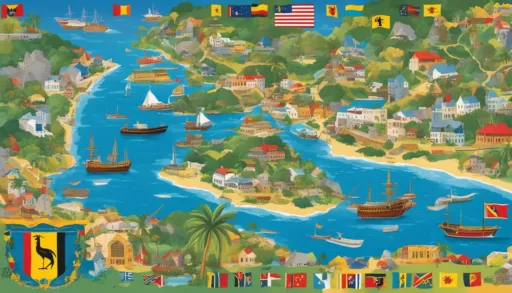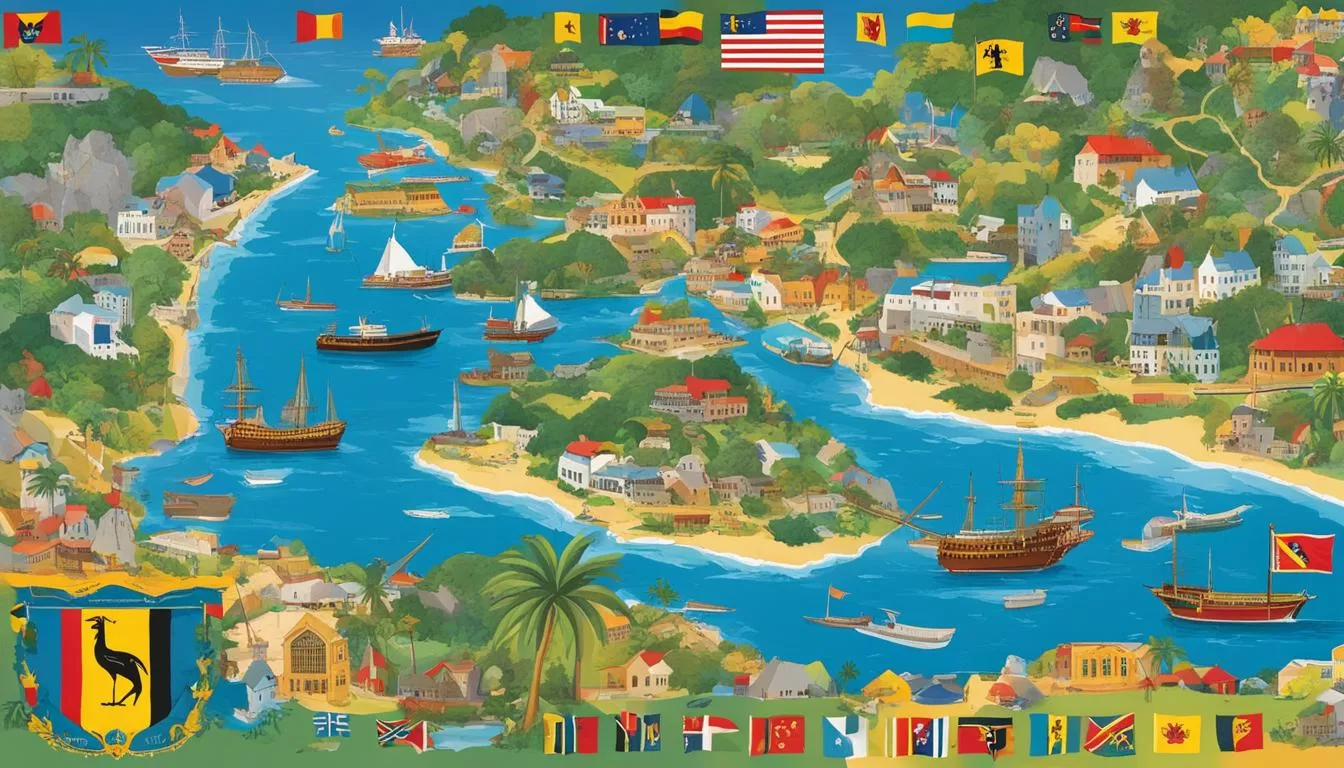For those curious about the languages spoken in Barbados, this vibrant island nation offers a fascinating linguistic landscape. English, reflecting the country’s historical British influence, serves as the official means of communication across this Caribbean gem. However, the local Barbados language diversity comes to life in the form of Bajan, a dialect that embodies the unique cultural identity of the Barbadian people. It’s an everyday language that carries the nuances of the island’s past and resonates deeply within its music, social interaction, and the engaging cadences of its locals.
Discovering the rich tapestry of Barbadian speech reveals the seamless blend of formal and informal, standard and creole, present on this sun-drenched island. It’s a place where language not only communicates information but also expresses cultural heritage, and sometimes, a secret code amongst its people. Join us as we delve into the linguistic treasures of Barbados, where every word and phrase tells the story of its history and the heartbeat of its society.
Key Takeaways
- English is the official language of Barbados, utilized in formality and echoing British linguistic standards.
- Bajan, an English-based creole with African and British influences, represents the informal vernacular of the island.
- Barbados language diversity is reflected in its adoption of phrases and vocabulary from various African dialects.
- Education in Barbados encourages multilingualism, with an increasing focus on French and Spanish in schools.
- Barbados has one of the highest literacy rates in the Western Hemisphere, emphasizing linguistic proficiency.
- The linguistic identity of Barbados is a harmonious interplay between its colonial past and Afro-Caribbean roots.
The Official Language of Barbados: English
As the official language of Barbados, English anchors the island’s communication across all echelons of society. From the bustling streets of Bridgetown to the formal chambers of its Parliament, English remains the definitive medium for discourse, administration, and education. The rich historical tapestry that envelops Barbados paints a picture of the English language adoption in Barbados as more than just a colonial remnant; it is a contemporary symbol of the nation’s global connectivity and adherence to international standards.
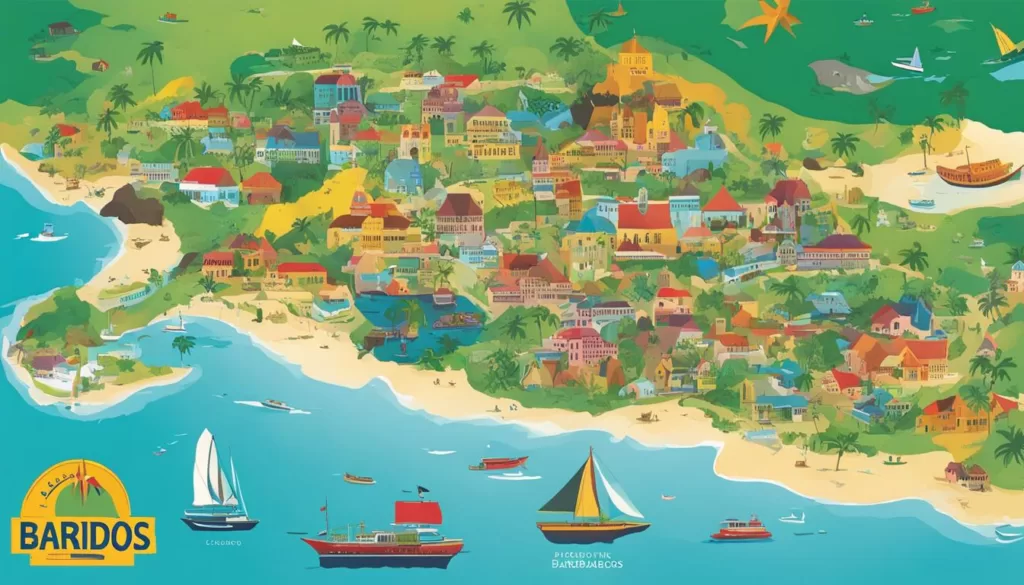
English in Administrative and Public Spheres
Through centuries of British influence, the English language has become deeply interwoven with the Barbadian identity. It is not merely spoken but lives through the island’s laws, educational syllabi, commercial affairs, and media representation. English in Barbados is reflective of its status as one of the official languages of Barbados, shaping the way in which Barbadians engage with each other and the world at large.
British English Influence on Barbadian Standard English
The colonial history of Barbados continues to echo through its linguistic preferences. British English, with its unique spelling and pronunciation, is mirrored in the standard English used throughout Barbadian institutions. This replication of British norms has entrenched itself in the official documents, literature, and even in the everyday language spoken in schools and government offices. Yet, it’s the spontaneous shift to Bajan dialect amidst informal conversations that truly illustrates the dynamic nature of Barbadian linguistics. Here, the legacy of English is as vibrant and enduring as the island nation itself.
Barbados offers a linguistic journey between the formal standards of British English and the colorful colloquialisms of Bajan dialect, underscoring its rich cultural history and the ongoing evolution of its linguistic landscape.
The Unofficial Tongue: Bajan Creole
Beneath the surface of its official English language front, Barbados vibrates with the rhythms of Bajan Creole, its unofficial linguistic heartbeat. This rich creole, replete with expressions harking back to its West African lineage, is a cornerstone of the nation’s oral tradition. It resonates with the legacy of its people, shaping a formidable identity for the island’s community through its ethnic languages. The persistently evolving nature of Bajan exemplifies the complexity of cultural interaction and the resilience of ancestral voices in Barbados.
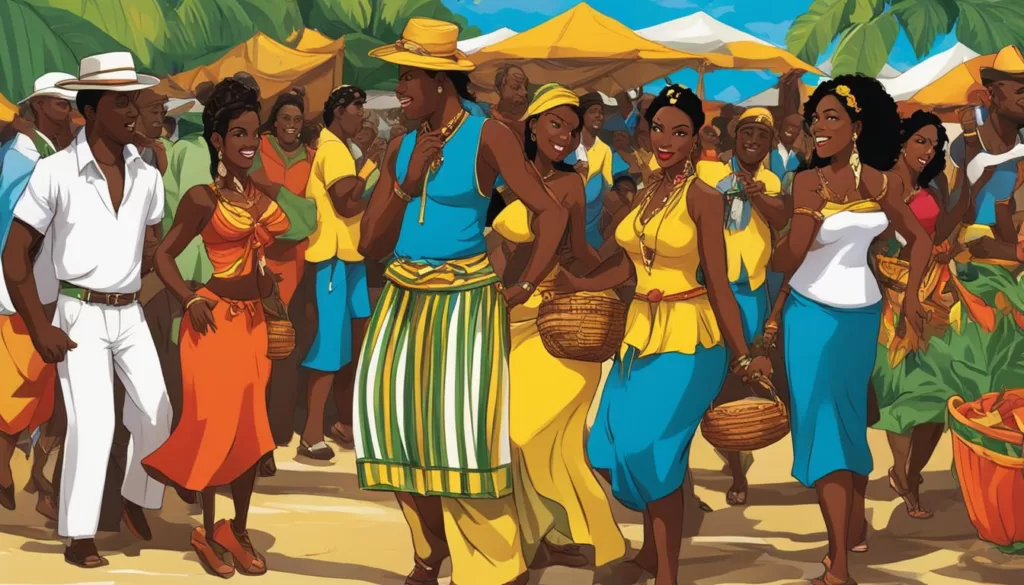
Origins of Bajan: A Mix of African and British Influences
With Barbadian origins steeped in a clandestine past, Bajan Creole emerged as a clandestine linguistic channel among the enslaved West Africans brought to Barbados. It carved out a niche within the island’s society, binding the community with a shared code, impermeable to the colonizers. A testament to the spirit and ingenuity of the people, Bajan carries the inflections and spiritual nuances of a suppressed heritage, standing today as a beacon of the island’s vibrant, rich culture.
Understanding Bajan Dialect Through Common Expressions
Encapsulating the everyday life and wit of the Barbadian people, Bajan dialect offers an assortment of idioms and expressions. These verbal gems provide insights into the collective psyche, but also reveal the seamless weave of African and British influences that define the island’s communicative tapestry. Let’s explore this further in the table below, which compares Bajan expressions to their English counterparts.
| Bajan Expression | English Translation | Origin |
|---|---|---|
| wunna | you all | Derived from the Igbo word unu |
| obeah | doctoring, mysticism | Comes from Igbo obia |
| Bim | Nickname for Barbados | From Igbo bé mụ́ |
| eye-water | tears | A calque from Igbo ánya mmírí |
| duppy | ghost | From Twi adope |
| Cou-cou | National dish | Reflects African heritage, related to “Fou Fou” |
| nyam | to eat ravenously | West African origin, shared across various languages |
| jook/juk | poke, spur | From the Fula word jukka |
| soso | only | Directly from Igbo soso |
| hard-head | obstinate | Composed from Igbo words ísí íké |
The Bajan Creole language, with its distinctive expressions, stands out among the ethnic languages of Barbados, characterizing the island’s spirited dialogue. It serves as a linguistic membrane that both connects and distinguishes the people of Barbados from their past and their present, and is undeniably, an intrinsic feature of the island’s cultural landscape.
Exploring Barbados Language Diversity
Barbados, while primarily known for English and the popular Bajan Creole, is witnessing an emergence of multilingualism as an exciting facet of its cultural identity. This growth in language diversity reflects a wider trend in which popular languages spoken in Barbados are shifting to accommodate global communication needs, particularly within the tourism and service industries. French and Spanish are now increasingly prominent in the Barbadian educational system, heralding a new era where language skills are as important as the island’s famed hospitality.
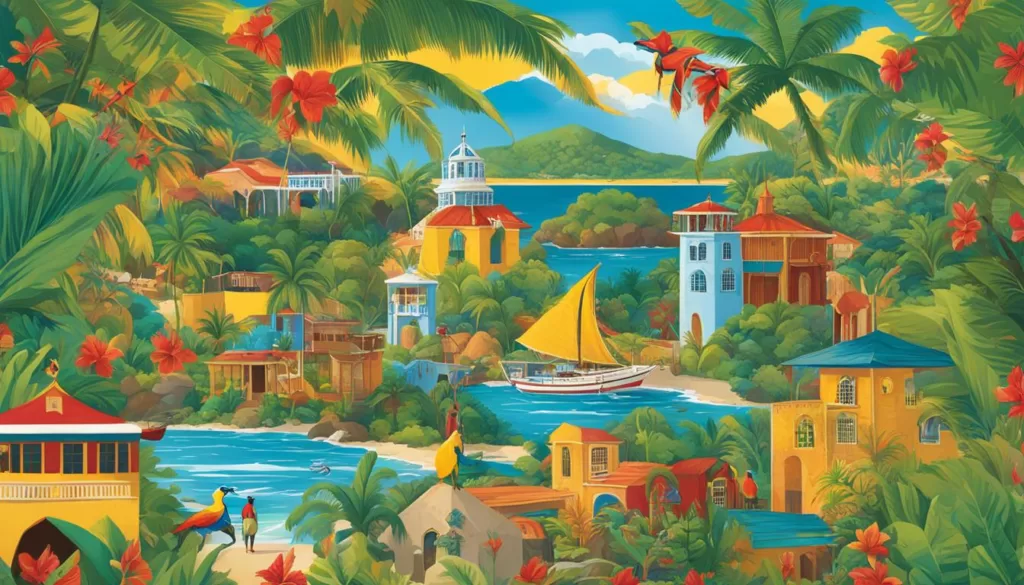
The linguistic scene on the island now goes beyond Bajan Creole. As Barbados continues to engage globally, the educational sector adapts by equipping the younger generations with competencies in additional languages. An understanding of French and Spanish not only broadens personal horizons but also enhances Barbados’ appeal as a destination that welcomes an international clientele.
Initiatives to promote language diversity are significant, considering the emphasis on hospitality in Barbadian culture. The acquisition of French and Spanish by professionals in this sector does not simply boost interactions with visitors; it fosters deeper cultural exchanges, enriching both the guest experience and the personal development of local residents.
- English: The linchpin of governmental, educational, and legal communication
- Bajan Creole: A cherished vernacular emblematic of Barbadian identity
- French: Becoming a favored second language among students and professionals
- Spanish: Rising in popularity due to cultural and business exchanges
Such linguistic expansion is integral to the island’s strategic goals. French and Spanish are not merely academic subjects, but vital tools that embody the island’s forward-thinking approach to global readiness and hospitality. With an increase in multilingual signage, menus, and services, Barbados is poised to reaffirm its standing as a melting pot of cultures and languages – a nexus where history meets the demands of a dynamic, modern marketplace.
Embracing language diversity enriches the tapestry of any nation. For Barbados, it heightens the island’s capability to host the world, inviting a symphony of voices to its shores.
Exploring the Linguistic Duality of Barbados: Bajan Dialect and Standard English
In the heart of the Caribbean, Barbados presents a unique linguistic landscape marked by the coexistence of the vibrant Bajan dialect and Standard English in Barbados. The duality of these languages embodies the island’s colonial history intertwined with African linguistic heritage, creating a rich tapestry of verbal expression that defines the nation’s cultural identity.
The Bajan dialect is not merely a means of communication; it’s a living testament to Barbados’s cultural evolution. Its cadence and vitality speak volumes about the island’s past, echoing in every burst of laughter and heated conversation. From the fields where sugar cane once grew to the coral-strewn beaches, the sounds of Bajan are omnipresent, resonating with the heartbeats of its people.
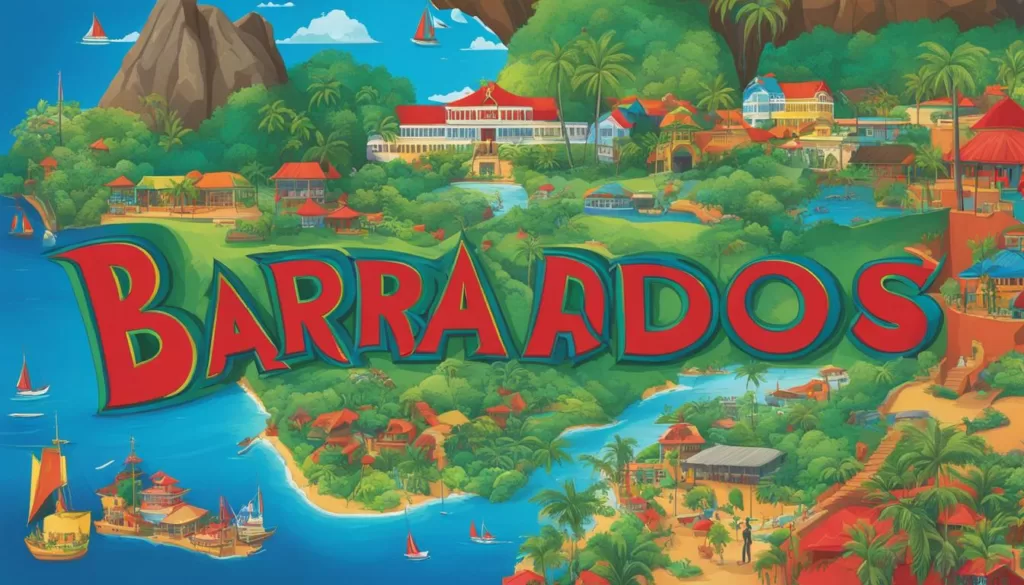
Moving from informal chats to formal affairs, Standard English in Barbados assumes the role of the official language for important transactions, maintaining a semblance of the British legacy. It’s the language of education and administration—a bridge that connects Barbadians to the wider world.
Understanding this linguistic interplay is crucial, not only to grasp the nuances of communication on the island but also to appreciate the cultural depth of its society. Here is a look at some widely used Bajan expressions and their equivalents in Standard English, a reflection of this intriguing duality:
| Bajan Expression | Standard English Equivalent |
|---|---|
| Wunna | You all |
| Cheups | A sigh of annoyance |
| Limes | Social gatherings |
| Ting | Thing |
| I gine | I am going |
| Wuh part yuh deh? | Where are you? |
The linguistic richness of Barbados goes beyond its shores, as Bajan expressions find their way into the literature and music that tell the island’s stories. Language, in this context, does more than define Barbadians; it unites them—in the rhythm of their speech and the shared history embedded in their words.
Barbados is not just an island of sun and sea but a narrative written in the language of its people—from the melodic tones of the Bajan dialect to the refined articulations of Standard English.
Language Education in Barbados: Embracing Multilingualism
The landscape of Language Education Barbados has rapidly evolved to encompass a diverse array of tongues, with educational institutions integrating languages such as French and Spanish into their curricula. This inclusion mirrors the island’s dedication to cultivating a multilingual society and reflects an understanding of the necessity for its citizens to be conversant in the languages that facilitate international discourse and trade.

In recognizing the rising winds of globalization, Barbadian schools are nurturing a generation equipped with the linguistic tools required to excel on a global stage. French and Spanish are no longer just exotic languages but essential instruments for future global citizens. This demonstrates a clear vision of the intertwining of culture and communication in today’s interconnected world.
The Role of French and Spanish in Barbados
Barbados’s commitment to language diversification particularly emphasizes the role that French and Spanish play in bridging cultural and economic gaps. As liaisons to both Europe and Latin America, these languages open numerous avenues for Barbadians, enabling not just individual growth but also strengthening the island’s competitive edge in tourism, international business, and diplomatic relations.
High Literacy Rates and Free Education
A hallmark of Barbados’s societal fabric is its high literacy rate, demonstrative of the nation’s unwavering commitment to education. With an education system offering free tuition through to the tertiary level, Barbados stands out as an exemplar in the realm of academic accessibility and quality. The ripple effects of such policies are profound, echoing through the higher caliber of multilingual professionals and the overall intellectual health of the country. Free access to education emboldens Barbadians to aim higher, reach further, and communicate across borders with confidence and proficiency.
Investing in language education is investing in the nation’s future—and Barbados is paving a multilingual pathway for its people to walk into a world that speaks many tongues.
The Cultural Tapestry: Ethnic Languages in Barbados
The interweaving of Barbados ethnic language influence within the island’s society paints a vivid portrait of a cultural mosaic, rich with the hues of its heritage. This melange of linguistic threads, drawn from across the Atlantic, forms a unique backdrop that is as enchanting as the island’s tranquil beaches. It’s a blend that has bestowed upon Barbadian Creole its distinct cadence—a testament to the resilience and adaptability of the island’s people and culture.
Stepping onto Barbadian soil is akin to entering a living kaleidoscope, where the creole dialect serves as a rich patch within the island’s language cultural mosaic. One may discern the African influences in the rhythmic speech patterns, the crisp echoes of British English in formal discourse, and the faint but undeniable remnants of Scottish, Irish, and even Amerindian lineages woven into the fabric of local dialects. Each ethnic contribution enriches the nation’s linguistic identity, rendering it as complex and harmonious as the Barbadian society itself.
Indeed, language in Barbados is not just a tool for communication but a canvas illustrating the history and identity of a people who have long embraced the confluence of diverse cultures. From the early days of settlement to the modern rhythms of Caribbean life, the island continues to celebrate its ethnolinguistic diversity. It is this very essence—this integrative societal ethos—that has shaped the vibrant, united community that proudly calls Barbados home.
FAQ
What languages are spoken in Barbados?
In Barbados, English is the official language and is widely spoken across the island for formal communication. Additionally, Bajan Creole, an English-based dialect, is commonly used in informal contexts. Other languages spoken include French and Spanish, especially within the hospitality industry and schools.
What is the official language of Barbados?
The official language of Barbados is English. It is the language used in government, legal affairs, education, and by the media in both written and oral form. English in Barbados is characterized by British English norms.
How prevalent is British English in Barbadian standard English?
British English has a strong influence on the standard English spoken in Barbados, tied to the island’s history as a former British colony. This can be observed in the vocabulary, spelling, and pronunciations commonly used on the island.
What is Bajan Creole?
Bajan Creole is an informal language or dialect spoken predominantly in Barbados. It evolved from a mix of African languages and British English and is characterized by unique vocabulary, idioms, and expressions.
What are the origins of Bajan Creole?
Bajan Creole originated among the enslaved West Africans as a means of covert communication. It is a blend of West African languages and the English they encountered in Barbados, creating a distinctive form of expression that remains a lively aspect of Barbadian culture.
Can you give examples of common expressions in the Bajan dialect?
The Bajan dialect includes expressions like “Wuh yuh doin?” for “What are you doing?” or “I gine to town” instead of “I am going to town.” These reflect the unique structure and pronunciation of the dialect.
What other languages are gaining popularity in Barbados?
With the island’s expanding multicultural communications, French and Spanish have become increasingly popular. They are now taught in schools and utilized in the tourism sector, reflecting a trend towards multilingualism in Barbados.
How does Bajan dialect differ from Standard English in Barbados?
The Bajan dialect has a more casual cadence and structure, with idiomatic phrases and simplifications that differ significantly from the Standard English used for formal communication in Barbados.
What is the significance of language education in Barbados?
Language education in Barbados plays a vital role in creating a multilingual society. The inclusion of French and Spanish in the curriculum, coupled with high literacy rates and free education up to the university level, demonstrates Barbados’s commitment to academic excellence and global engagement.
What does the ethnic linguistic influence look like in Barbados?
The ethnic linguistic influence in Barbados is diverse, reflecting its Afro-Caribbean majority with historical links to African, British, Scottish, Irish, and even Amerindian heritage. This mix has contributed to the rich lexicon of Bajan Creole and the island’s distinctive cultural identity.
